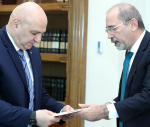You are here
Unity among diaspora Palestinians needed
May 07,2014 - Last updated at May 07,2014
One of the most obvious results of the failure of the Palestinian-Israeli peace talks has been the realisation that disunity greatly weakens the Palestinian negotiating position.
Not only were Palestinian President Mahmoud Abbas and his team unable to answer the simple question of whether they speak for all Palestinians or not, they were also unable to secure any pressure stemming from the worldwide Palestinian diaspora.
Unlike Israel, which is able to milk its diaspora for support and political pressure, the Palestinian disunity inside is visibly reflected in apathy and lack of coordination outside.
Palestinian disunity also weakens an even larger power base: international solidarity with Palestinians is badly affected by it.
The absence of a united front in thought and strategy means that individuals, groups and countries that might otherwise be part of Palestinian solidarity efforts are marginalised and unused.
The deep split that was caused when Hamas violently took over power in Gaza in 2007 has reflected on all Palestinian diaspora.
In any country with a substantial Palestinian population one can see how this split is reflected in local events and solidarity activities, even when one would expect all Palestinians to be in agreement over a particular issue.
While the PLO-Islamists split is the most obvious, many other smaller splits have been evident among Palestinian diaspora.
The lack of consensus on the best way forward in the struggle for independent Palestine has been obvious in diaspora communities, university student activities and among solidarity groups.
This absence of a clearly agreed to strategy often resulted in Palestinians often bad mouthing the Palestinian leadership, whether in Ramallah or in Gaza, as “appeasers of Israel” or “agents of the occupation”, for one side, or “agents of Iran” and “religious extremists”, for the other.
People who genuinely wanted to support Palestinians felt that they had to take sides or else they would not be trusted.
With the PLO-Hamas reconciliation now on the right track, the question that needs to be answered is whether it will leave an effect on Palestinian diaspora, in particular, and among global supporters of Palestine, in general.
The extreme reaction by Israel, and to a lesser degree of the Americans, should be the best indication that the occupiers of Palestine and their main allies are not happy to see Palestinians united.
While Israelis often criticised Abbas as being weak and unable to speak for all Palestinians, once the unity train was on track, they shifted gear and made their crazy ultimatum.
Abbas, Netanyahu says, has to choose between unity with Hamas and peace with Israel.
The subtext of what Netanyahu was saying is a realisation that Palestinians will now be stronger in their pursuit of their goals, something Netanyahu and the occupiers are not happy with.
The beginning of the healing process in the nationalist-Islamist divide, however, does not appear to have dented the deeper generational division, especially on the issue of long-term strategies.
Palestinian leaders in Palestine are committed to the two-state solution, while many of the vocal activists in the diaspora give preference to the one-state solution, irrespective of whether such idea has any serious opportunity to succeed in the short term.
On the other hand, the leadership in Palestine has not been supportive of the biggest tool of the activists in the diaspora, the boycott, divestment and sanctions of Israel.
At the height of the recent talks, Abbas refused to support any boycott of Israel, preferring only boycott of Israeli settlement products.
For unity to succeed in the diaspora, serious effort needs to be exerted on bringing the ideological and strategic plans together.
If the PLO is indeed going to be revamped, many hope that its new incarnation will not be based simply on a redistribution of seats between Fateh and Hamas, but a much deeper restructuring that includes many of the young activists in the diaspora, as well as tactical agreement on priorities of the Palestinian strategy.












